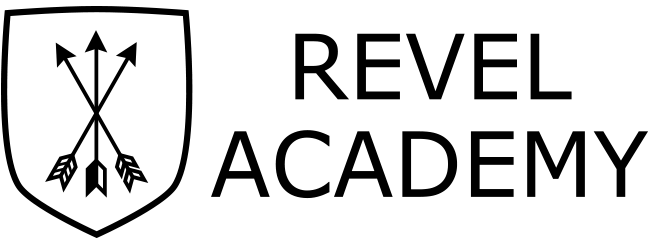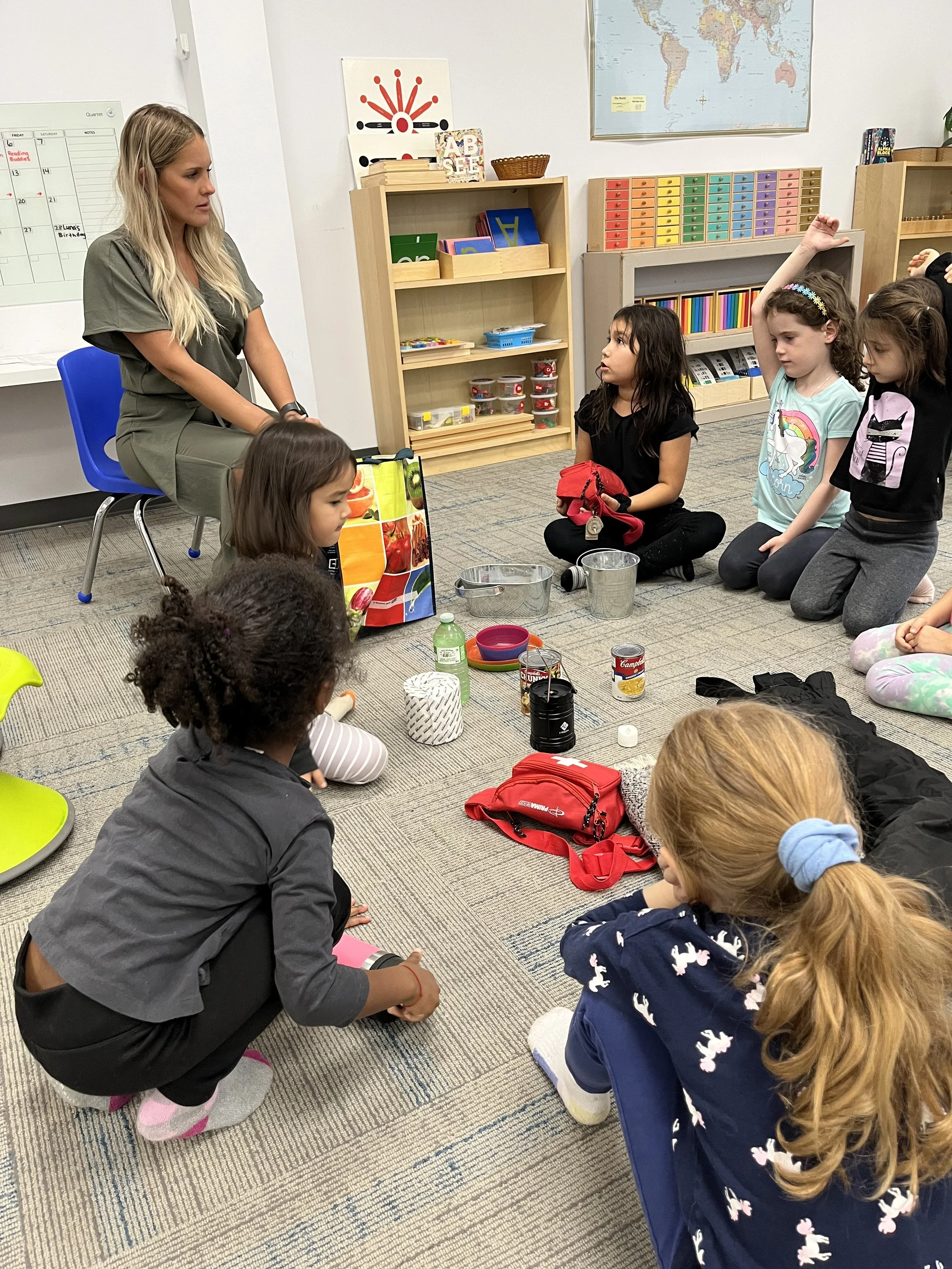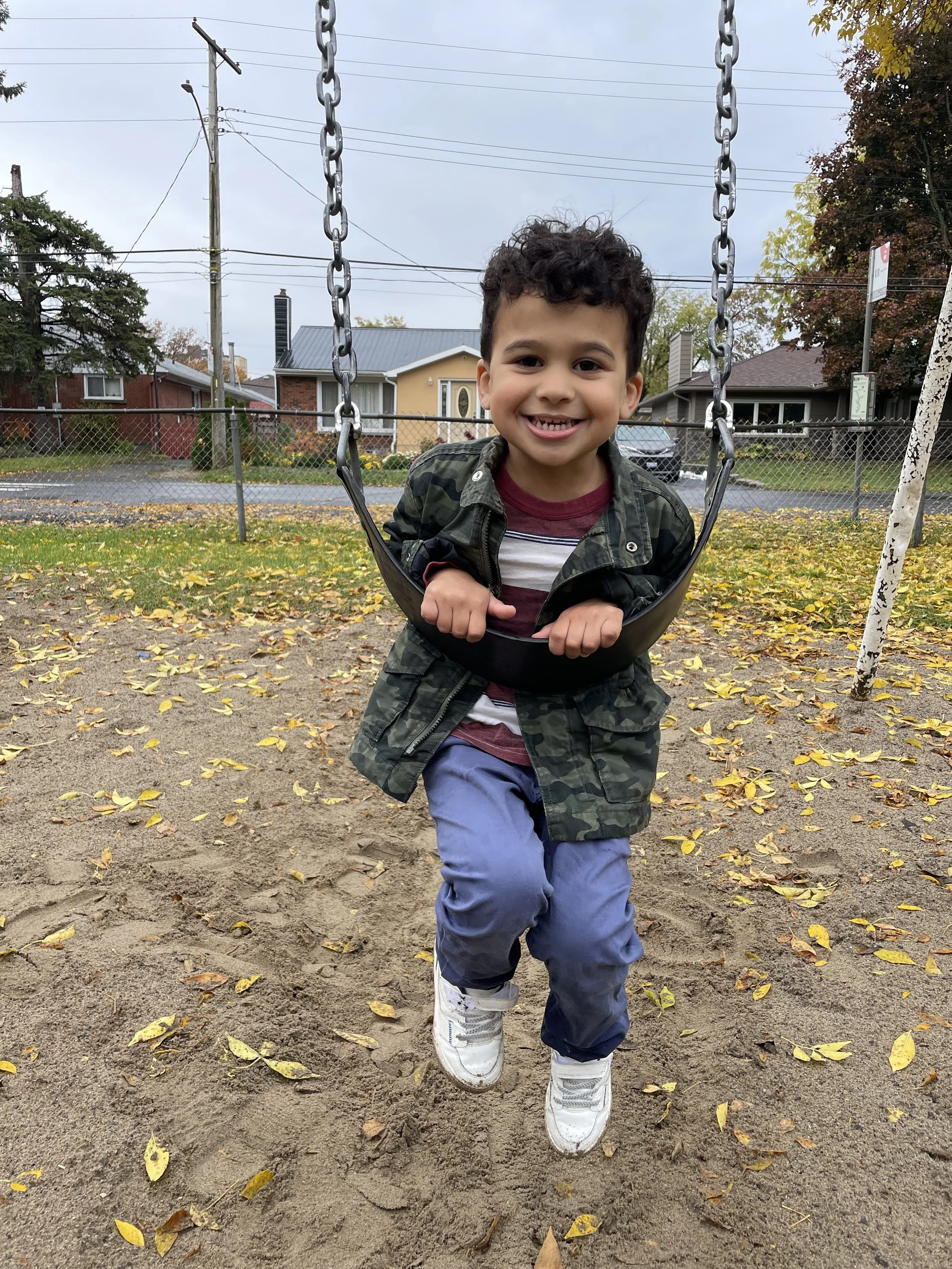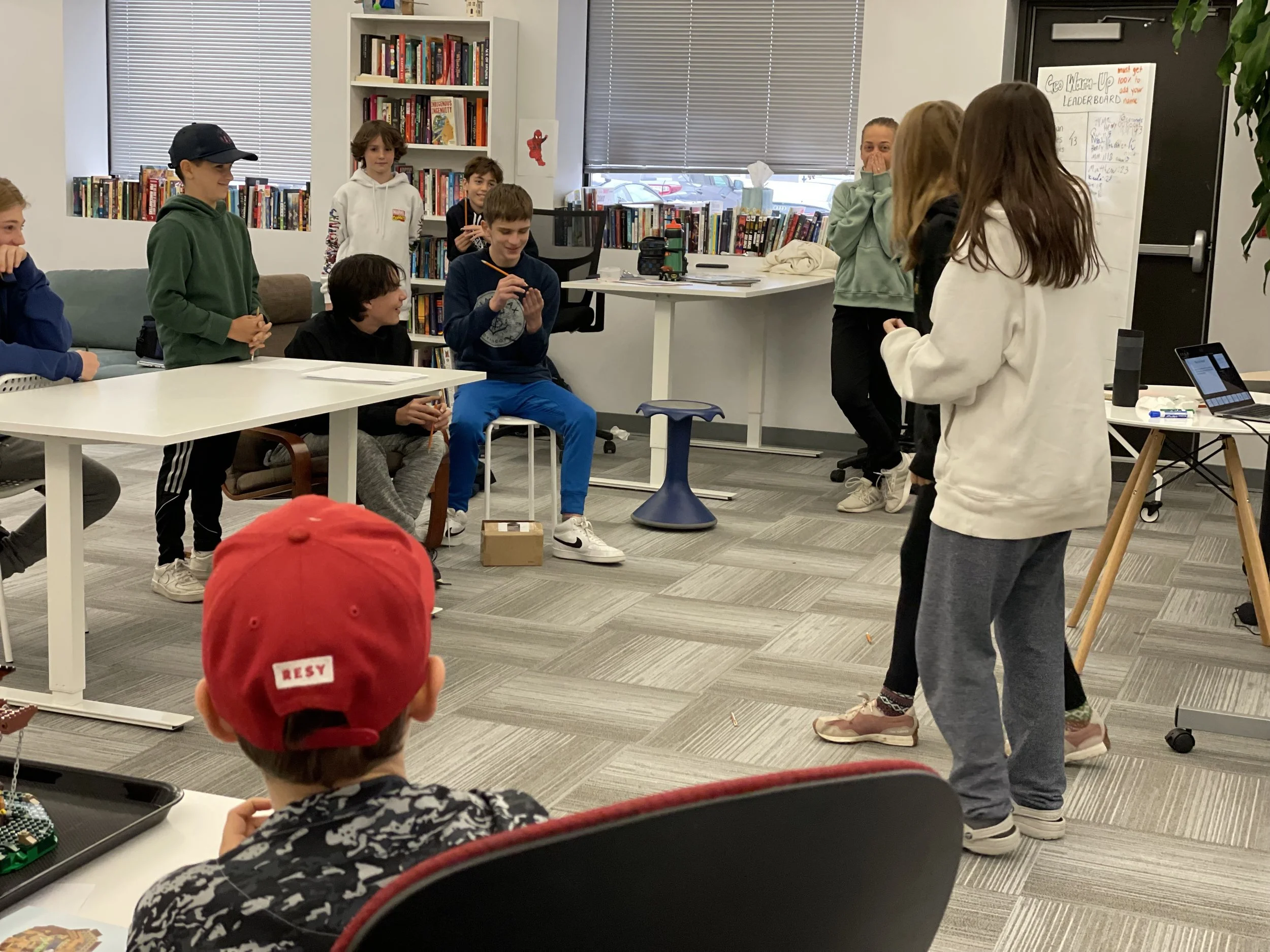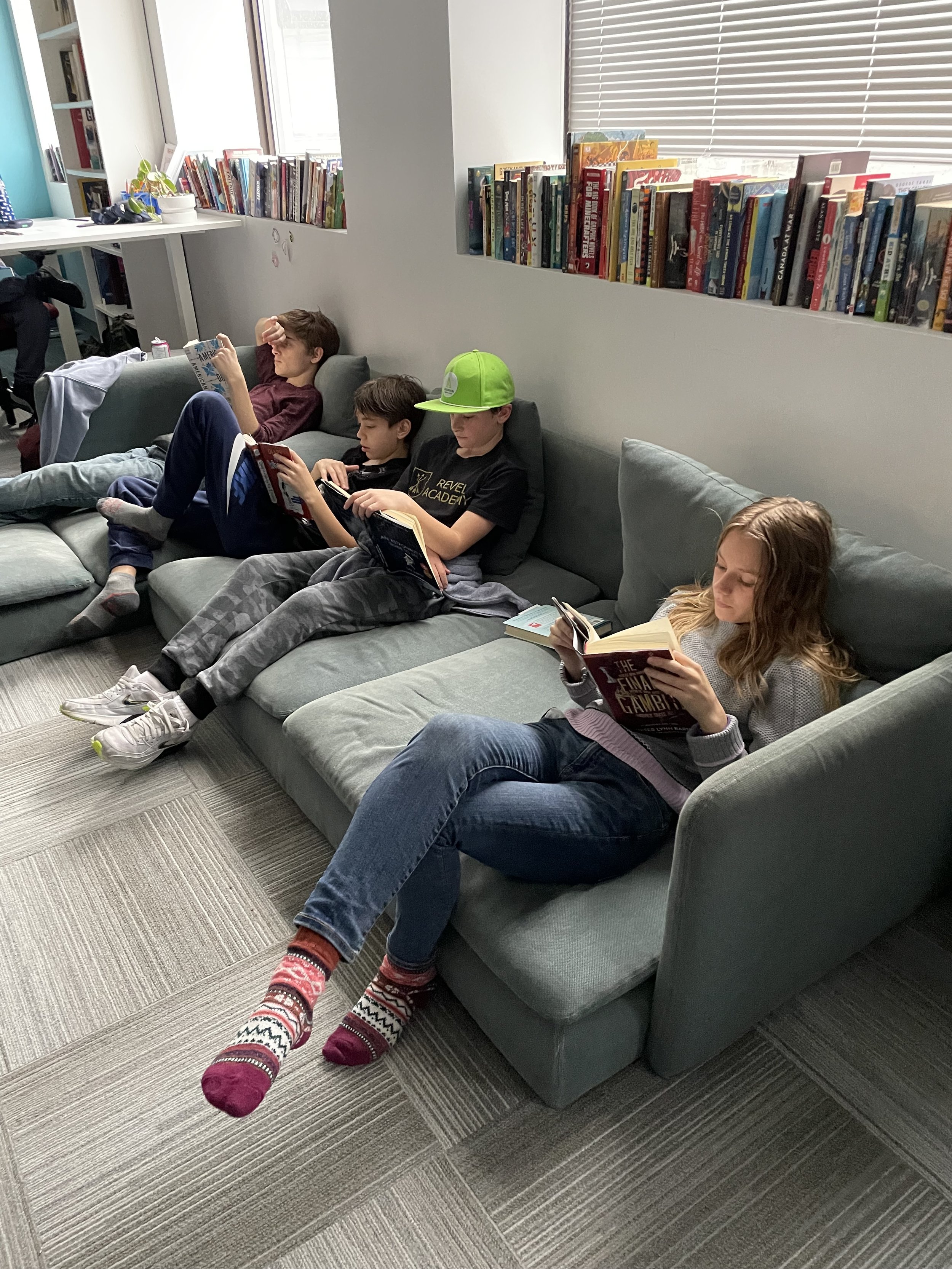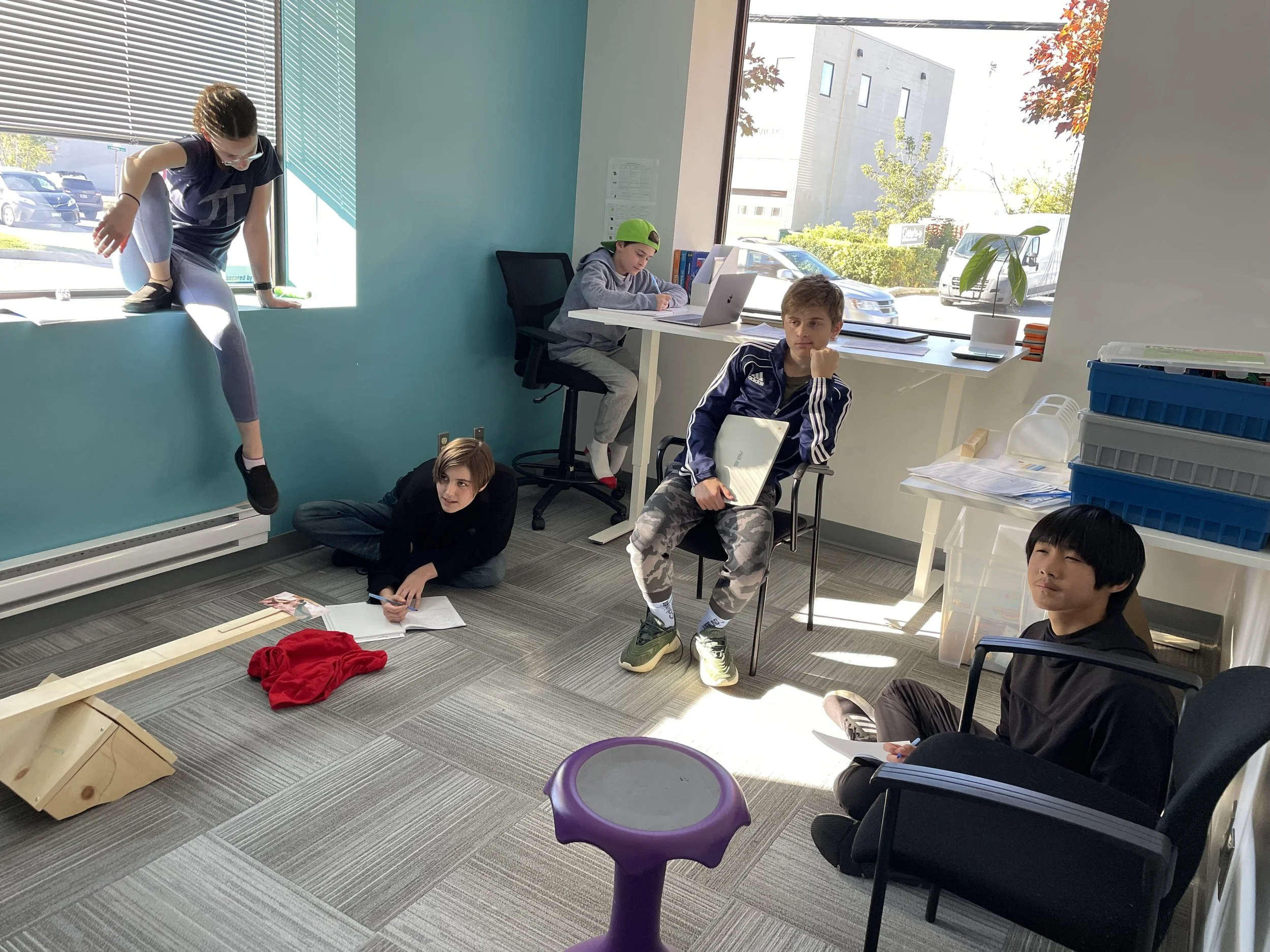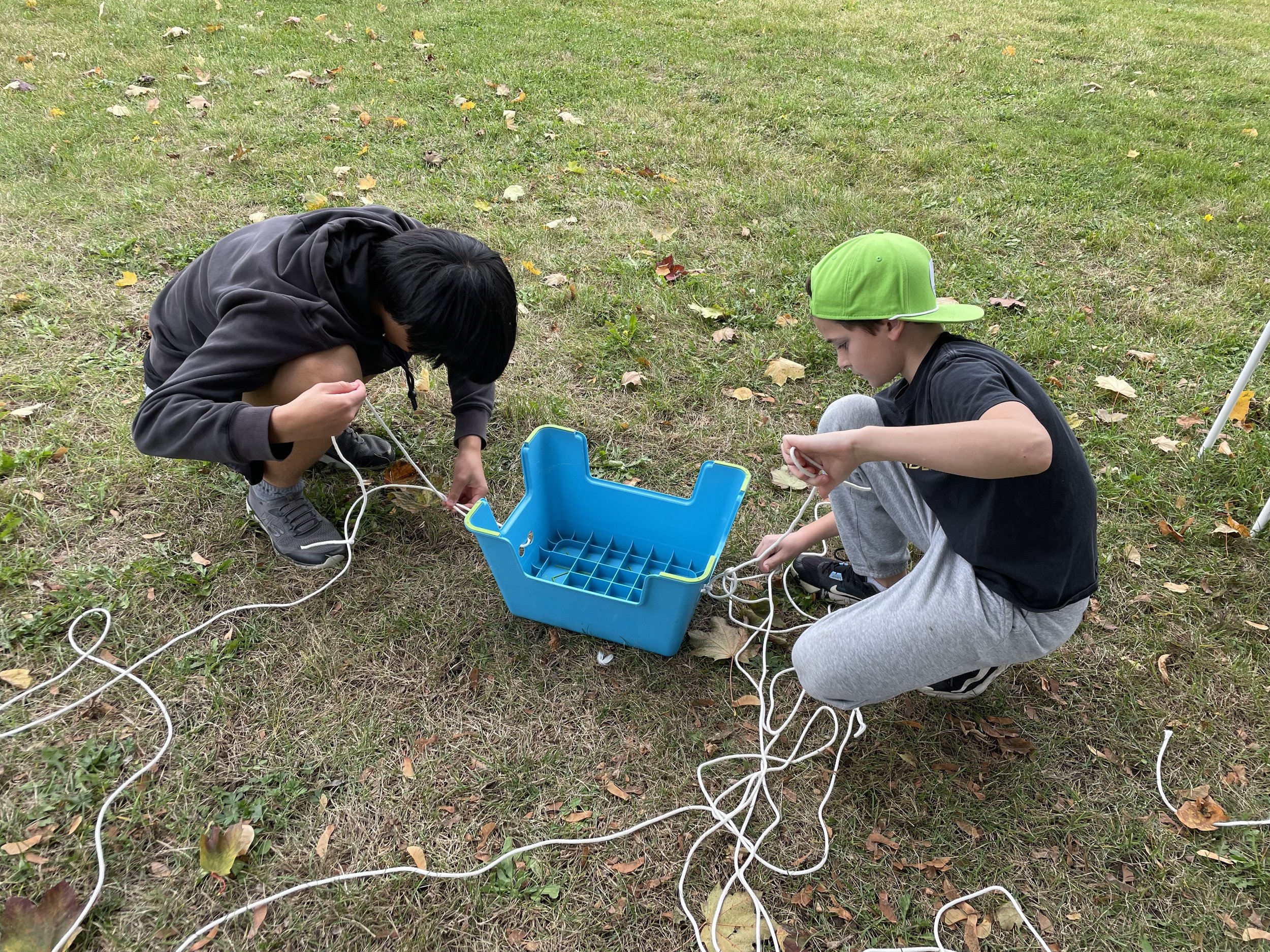Revel Recap: October 23 - 27, 2023
Spark Studio
Mindfulness
Two Spark learners used the spinner game to lead us through various poses and stretches during our Monday morning yoga session. With the gentle sound of music and the Sparks full of smiles, the studio was very calm. On Tuesday, we brought our minds to a world of "What ifs." The podcast "What if it Rained Candy" swept the Sparks into a beautiful story that explored the extraordinary possibilities of a candy shower from the sky. On Wednesday morning, we used our creative skills and drew volcanoes. Some learners added more detail to their drawings, including palm trees and animals. To move our bodies and get our heart rates up, we gathered around Ms Kaitlin for a 15-minute HIIT workout. The Sparks worked really hard and would check how fast their heart was pumping after each move. To end the week, we read the story, A Thank You Walk, by Nancy Lowen, followed by writing in our gratitude journal.
Quest
As we built on our powerful tool, the KWL chart, the learners had many questions about natural disasters which shape our world: hurricanes, flash floods, and tornadoes. Tuesday, we embarked on a thrilling adventure focusing on tornados. The Sparks had many questions and shared many experiences. The Guides then presented a printed PowerPoint presentation all about these natural disasters. During our readings, the Sparks discovered a tornado is a powerful whirlwind that forms during thunderstorms, spinning at incredible speeds. They also learned about safety during tornadoes and where to seek shelter. As a group, we wrote one fact about tornados and drew a tornado.
Wednesday, we turned our attention to hurricanes. The learners discovered that hurricanes are more common in tropical areas, and luckily for us in Ontario, we are safe from these giant storms thanks to the protective embrace of the Great Lakes. To continue our studies, the Guides provided a pile of items in the middle of the circle. The Sparks were informed that a Category 4 hurricane was headed their way, and they needed to pack one survival bag. Afterwards, the Sparks went compared and contrasted hurricanes and tornadoes.
On Thursday, we kicked off Quest with a game of charades. The learners each took turns picking a different form of severe weather to present in front of the class. Next, we read some facts about floods from a presentation and watched a video called Flood - The Dr. Binocs Show. Using our imagination, we thought about how we would feel and what we would do if a flash flood hit. The groups presented in front of the class, listening well to each learner's imagined experience.
Math
This week, the learners have been using the material from the shelves and, for some, the Singapore math workbooks. The Addition Board is a hands-on favourite among the Sparks, as it is a visual way to grasp the concept of addition. Additionally, many learners have been using another valuable resource called the Addition Strip Board, which allows the learners to explore numbers 1 through 18 and comprehend the concept of addition. Lastly, Counting Chains are colourful and interactive tools that not only work on counting, but also skip counting, patterns, and sequences.
French
This week in French, we continued to learn how to say various weather and season vocabulary in French. On Monday, we started learning the song "La météo" to help us remember the terms. For the rest of the week, we worked on our long-term art project that is helping us to learn the names of the clothes we wear for each type of weather.
Geography
In our Geography booklets, the Sparks focused on "What is our country and what province do we live in?" We began by singing our national anthem and listened to a song called The Canada Song. The Canada Song went over all the provinces and territories. The learners agreed that they preferred the Continent song and that the new tune would take a bit to get used to.
With our study of where we live, the Sparks are also learning more about one another. We learned that not all of us live in Ontario but that some live in Quebec. We also learned that some of our learners come from different countries and continents as well. As a studio, each learner is working hard on their "Me on the Map" booklet. Next week, they will venture off to learn about which city they live in and what school they go to!
Reader/Writer Workshops
Group 1 focused on single-letter sounds such as "a." As a review, we practised writing the letter a. Each learner came up with a word that began with the letter of choice. Everyone wrote the words together, and they came up with a looonng list! Group 2 worked on reviewing some familiar digraphs. We went over ch, sh and th. Using our Waseca word booklets, we reviewed each picture and discovered what word the image must be based on the digraph we were looking at. Each learner practised the sound, told the group a word that starts or ends with each different sound and then wrote down their word.
As a group, at the end of the week, we introduced three new sight words: it, up, and am. The Sparks took the time to write each word, trace it with their finger, and find it in a mix of other sight words. During our read-aloud, the Guide showed the learners the pages as they were reading so that the Sparks could see and say when a sight word was read. We encouraged the Sparks to tally the three new sight words during DEAR as well and share how many they found in the books they were reading.
Additional Highlights
With Halloween approaching, our studio has become a decorative land of spookiness. The Sparks have been designing pumpkins and making ghost globes. We have read many books such as J is for Jack-O-Lantern by Denise Nelson, Happy Halloween Little Critter by Mercer Mayer and Franklin's Halloween by Paulette Bourgeois. In our sensory table, we filled it with water beads. We added pretend spiders to the mix and plastic eyeballs. The learners used this bin to explore texture and colours as a fun way to offer sensory and fine motor development.
One of the life skills we focused on this week was the art of linen washing. We introduced how to use washboards, a classic method of cleaning clothes. Learning life skills at the Sparks' age is essential, and the learners were eager to get their hands on this practical task. This weekend, you could ask your learner to practise their skills by washing and folding laundry.
SAVE FRED is back at it again! The gummy worm still cannot swim! Save Fred is a cooperative activity that has the learners work in pairs or small groups. Fred's boat capsized, and they needed to save him, BUT his life jacket was under his ship. Using only paper clips, the learners had to find a strategy to save him without falling into the water.
To end our week, we danced and sang with our party lights on! Next week, we will focus on another life skill and learn more weather-related information.
Discovery Studio
Mindfulness
To kick off our mindful practice this week, we read the story "I Am Fine for Right Now" by Dr. Daniela Owen about identifying stressful or anxious situations and practising calming techniques at the moment to remind ourselves that 'right now, I am fine.' On Take Your Own Adventure Tuesday, the Rebels chose their personal favourites for mindfulness and coloured or worked on puzzles. For Wonder Wednesday and Thursday, we tried making origami foxes. It was intricate and challenging, and we used this activity to reflect on strategies for regulating our emotions when we get frustrated. For Feel Good Friday, we had a great Boomwhackers jam session where learners tried out Halloween tunes such as Monster Mash and Spooky Scary Skeletons.
Launches
Monday's Launch challenged Rebels to join forces in their new Session 2 Squads to solve a series of questions all about different candies. Rebels used the research techniques they worked on in Week 1 for Candy Quest and applied them to the team challenge. Tuesday's launch reviewed the Geography badges Discovery Rebels can earn, including continents, oceans, Canada, North America and beyond! Wednesday's squad check-in meetings were very productive, and most Rebels headed into Core Skills with an updated Google Sheet Goal Trackers and two clear goals for the morning. Thursday's launch was about the upcoming Learner-Led meetings. Rebels reviewed a list of questions their families may ask and discussed what else to expect. Friday's Current Events report featured a continued conversation about Rebel questions from last week on the Israel-Hamas conflicts. Building off last week's discussion on borders and this week's Civilizations topics, Rebels were given an "Imagine This" scenario: You are the United Nations, and you are tasked with coming up with a list of peaceful resolutions for the ongoing conflicts. If sharing the land is not an option, what could you suggest?
Reader/Writer
Rebels took a deep dive into plot maps. Breaking down the algorithm for fictional and fantasy stories, Rebels examined the framework of expositions, rising actions, climaxes, falling actions and resolutions in different fictional stories. Using Harry Potter and the Philosopher's Stone as our mentor text, Rebels sorted general points into each element of a plot diagram before making one of their own for their upcoming fictional story! Once they submitted their plot diagram, Rebels spent the remainder of the workshop using Book Creator to develop their stories.
Math Lab
Welcome to Session 2 Math Lab, Discovery - and oh, how sweet it is! This week, Rebels looked at the journey map and connected the last essential question, "How many?" and this session's question: "What do we have now?" This series of labs will focus on changes to quantities using the four operations. To kick off their first lab, Rebels reviewed one important way that mathematicians can show their work and share their thinking, and this is through different mathematical statements like expressions or equations. As they work through their Problems of the Week, they are encouraged to find ways to use these in their solutions. To link with our Candy Quest, we then did an investigation into Real Fruit candies. Rebels reviewed the history of Canada's Food Guide and why nutritional values have changed over time, as well as why there must be labels on things we consume. Then, they captured important information from the Real Fruit label and had to determine what a healthy portion would be. They learned that serving sizes on the packaging can be misleading and that the 19 grams of sugar listed was for only nine candies in the bag. Working backwards, they determined that three candies would be about six and one-third grams of sugar. Since this is closer to 5% of the recommended daily value, which is considered a little, rather than 19%, which is regarded as a lot, the Rebels celebrated by each eating three candies!
Civilizations
This week's read-aloud took the Rebels through the Age of the Crusades. They made significant connections between current events and the city of Jerusalem, especially the three key religious groups of the time and their holy relationship to the land: Jewish peoples, Muslims, and Christians. They mapped the Islamic Empire's expansion circa 1100 CE, as well as routes of English, French, and Italian knights who travelled to Jerusalem as a part of their code of chivalry. We also compared this map activity to more modern maps of Jerusalem, specifically looking at Israeli-populated areas vs. Palestinian-populated areas compared to the various holy sites. Given that our studio demographic represents all three religions and more, we are very proud of the Rebels for demonstrating such maturity, respect, and thoughtfulness during their Socratic discussion.
French
This week, the Rebels continued to work hard to make their artifact for our Revel museum. We also did some exercises to practice giving directions in French to Camomille, the witch. We completed a word search to learn Halloween vocabulary, such as pumpkin, candy, fear, spider, and more spooky terms!
Quest
Rebels jumped into Week 2 of the Candy Quest, learning all about media literacy and persuasive techniques. On Monday, Rebels were introduced to various terminology and techniques advertising companies use to persuade their audience. Once Rebels created their Persuasive Techniques Word Wall, they watched a series of candy commercials and thought critically about the techniques being used. Why is it important to think critically about the advertisements we are exposed to daily? How can learning about these techniques help us to become more self-aware consumers? On Tuesday and Wednesday, Rebels were tasked with creating their own candy commercial in 45 seconds or less using two to three of the persuasive techniques we learned about at the beginning of the week. After filming and editing, Rebels presented their commercials to the team, and they had to guess which techniques they used in their commercials. It was such a great week, and Rebels gained a lot of insight as to how they're going to market and advertise their edible slime as they start to brainstorm their candy brand. Next week, we jump into the Chemistry of Candy, where Rebels will participate in a series of experiments to gain a deeper understanding of how candy is made.
Physical Development
On Tuesday, we met in the gym and started with an endurance activity where the learners sprinted to five separate lines and performed various exercises at each. After this warm-up, we enjoyed playing Crab Soccer and Capture the Flag. Everyone did such a fantastic job participating and showed excellent teamwork skills! Thursday, learners headed outside for Capture the Flag or games of their choice.
Exploration
Mindfulness and Launch
On Monday morning, we took part in some breathing exercises before preparing to take the first three subtests of the IOWA exam. We did our best to calm our minds, prepare our materials, and settle in a comfortable spot. Tuesday's yoga flow featured solely seated and reclined poses, focusing on gentle neck movements and stretches for all four limbs. On Wednesday, we got in a circle, each lit a candle and took time to look at the shapes, colours, and images created by the flame. We then spoke about how each of us has a light, and we should be proud to let it shine, not dimming it for others. Lastly, we reviewed "candle-blower-outers," as discussed by Brene Brown, and how we want to surround ourselves with people who let us be our true, brilliant selves and that we, too, need to lift those around us. Thursday's yoga had Rebels focusing their practice on balancing poses and being mindful of how the left and right sides of our bodies may move differently. Thursday's intention quote was "turn your gaze inward," as Rebels were encouraged to listen to what their inner voice was saying when/if they fell out of poses and how to reset before starting the next pose. On Free Choice Friday, learners coloured a triangle art piece and read their novels.
Quest - The Science of Where
What BIG IDEAS are connected to our Science of Where Quest? To launch learning this week, Rebels discussed some SEEP statements - ideas that spark connections to the Social, Economic, Environmental and Political aspects of geography. For example, what thoughts come to mind when you hear this statement: "People's activities are related to the physical features and processes in their region"? One Rebel summed it up well when they said you can't ski in Florida. Building on last week's introduction to the Environmental Systems Research Institute (ESRI) and their Geographic Information System (ArcGIS technology), Rebels conducted deep investigations into three elemental StoryMaps this week. On Monday, Rebels linked up with Running Partners and agreed upon a few ROEs or Covenants to ensure they keep each other's working standards high, and then they got to work. Each small group was assigned one of three investigations: Discovering Patterns in Global Wildfires, Air Quality, or Coastal Flooding. Tuesday's investigation focus was on quantitative data. Rebels were tasked with using Google Sheets to organize the data they extracted from their respective StoryMaps and viewed tutorials for using spreadsheets to generate various data displays. The wildfire groups had to create a double bar graph to compare different years of monthly data; the coastal flooding groups needed to use a combination line and bar chart to compare high tide floods to sea level; and the global air quality teams had to create a detailed data table housing five different categories of information for highly populated regions such as population, micrograms per cubic meter of particulate matter 2.5, related death rate etc. On Wednesday, the smaller teams merged by topic to review their research progress and divide and conquer any remaining tasks for the investigation. During Thursday's team presentations, Rebels shared the most significant takeaways on each topic with the studio.
Math Lab
This week, the Rebels finalized their credit card applications by learning more about currency and exchange rates. We also explored how one might pay off a $ 1,000 balance, looking at the pros and cons of only paying the minimum monthly payment. Rebels were shocked to learn that this strategy would take about six years and incur more than $500 of interest! Before their application was approved, Rebels had to come to The Bank of Mel and walk through their account contract, demonstrating they understood its annual fee, interest rate, and foreign transaction fee and that they would be required to pay at least the minimum monthly amount to maintain a good credit score. Since they all declared travel plans outside of Canada, bank meetings also discussed Thursday's CAD: USD exchange rate. Rebels needed to state they understood the 1: 0.72 rate, that this is a floating rate which changes daily, and agree that their credit card statements will reflect any foreign charges exchanged into Canadian Dollars. Many Rebels completed their application and signed their card - they promised to protect their personal information by not sharing their pin or CVC with anyone and storing their card securely.
Reader/Writer
Welcome to Reader/Writer Session 2! In this session, Rebels will explore persuasive writing as they create a travel pack for a Canadian province that demonstrates an understanding of how to use persuasive techniques in their writing. Rebels reviewed the badge expectations and reflected on what they were proud of from the last session and what changes they wanted to make going forward. Rebels took a deep dive into various persuasive techniques and examined how the author's purpose is to affect an audience's pathos, ethos or logos (emotion, ethics or logic). We played a quick game of "Buy My Pencil," where Rebels created pitches in 30 seconds or less to convince the studio that their pencil was the best using some of the techniques we discussed. Rebels then selected their province to focus their workshops on as they develop their travel guides and infographics in the coming weeks.
Civilization
The year is 1532 when the Old World meets the New World for the first time in a South American conquest that would alter the global landscape. On Tuesday, Exploration Rebels researched how the Spanish victors overcame incredible odds, what advantages each civilization held, and the possible reasons why the Incan people allowed the Spaniards into their empire. On Thursday, we watched the second half of the Conquest chapter from the Guns, Germs, and Steel documentary. We discovered how the Conquistadors had a weapon they weren't even aware of, which proved more potent than any gun or sword - the germ. We ended our class with a Rebel-led Socratic discussion on both days that required Rebels to put themselves in the shoes of the conquistadors and the Incan people.
French
This week, we played a long Harry Potter-themed mystery game, "Qui a ENCORE ouvert la chambre des secrets?" (Who opened the Chamber of Secrets AGAIN?) to practice asking questions in French. The engagement was high as learners had to ask questions such as: Where were you? Who were you with? How do you know this person? By the end of Wednesday's class, the learners had solved the mystery!
Additional Highlights
The majority of our core skills time was used for IOWA testing this week. To celebrate completing all subtests, the Exploration Rebels voted to hold a pizza party on Friday. A big thank you to the two learners who helped to organize the order!
Launchpad
Classical Physics
Walking into the Physics Lab, Launchpad Rebels discovered Melanie Martinez lying unconscious on the end of a massless seesaw, suspended over a pool of liquid hot magma. The other end of the seesaw is tied to the ground so that Melanie is neither rising nor falling at the moment. While surveying the situation, the evil mastermind slices the rope, and in an instant, they need to decide where to jump on the other end of the lever to save Melanie. They only have one shot; could they determine the precise spot while not ending up in danger themselves? Launchpad used their text, videos, simulation, and practice problems to learn more about levers before coming together to model their solution.
After learners had witnessed how levers can be used to magnify a force (aka "mechanical advantage") yesterday, they were ready to explore ways to use another "simple machine," the pulley, to gain a similar mechanical advantage. They began by completing research to understand how pulleys work and then had to demonstrate their understanding of force, work, mechanical advantage and pulleys through an "Explain Like I'm 6" exercise.
Using what they learned on Wednesday and Thursday, Rebels used items from the Maker Space and Physics Lab to build their pulley set-up that balances a 300g weight with a 100g weight (or any larger weights that maintain a 3:1 ratio). Learners quickly figured out set-ups that would allow them to achieve the goal, but building the system of pulleys with the materials provided proved more difficult! Once the goal was reached, the Rebels were then given pulleys and tasked with lifting a fellow learner off of the ground in under 20 minutes. Excellent teamwork, Launchpad!
After a busy week full of hands-on challenges, Rebels used their Quest period on Friday to review or learn more about one-dimensional motion, forces, and Newton's Laws of Motion.
World History
This week, Launchpad focused on Ancient Egypt, one of the most impressive and interesting civilizations in history. The Egyptians accomplished amazing feats, especially in the areas of agriculture, language, and architecture. None of it would have been possible, however, without the Nile River. On Tuesday, Rebels researched Egypt's military, political, economic, and ideological forces (ideas) to decide what lessons modern civilizations might learn from Egypt. They then posted their answer to given questions before meeting for a Socratic discussion led by one of their fellow learners. On Thursday, we contemplated how similar our current lives are to the daily lives of Ancient Egyptians. Learners focused their research on answering the question: Which of the following will be the most important for you at 20 years of age, and which will be the least important: secure borders, a robust economy, safe neighbourhoods and cities, a just police force and legal process, vibrant artistic achievements and technological breakthroughs, or something else? Why? After posting their decision and reasoning, learners came together to discuss and further their thinking with the help of a learner-led Socratic discussion.
French
This week, we played a long Harry Potter-themed mystery game, "Qui a ENCORE ouvert la chambre des secrets?" (Who opened the Chamber of Secrets AGAIN?) to practice asking questions in French. The engagement was high as learners had to ask questions such as: Where were you? Who were you with? How do you know this person? By the end of Wednesday's class, the learners had solved the mystery!
Creative Writing
This week was all about short fiction in our Creative Writing workshops! On Monday, our guest guide brought in books that feature short stories written by a wide variety of authors. The group then got into pairs and selected a story to read aloud to one another, discussing what they noticed, what they enjoyed, and what didn't work for them.
On Tuesday, we used our time to think about and discuss how we make short fiction seem "true" and feel "natural?" Where is the line between fiction/non-fiction if we are borrowing so liberally from real life? What do we put in our stories so that they are grounded enough in lived realities that the reader will "come along with us" as we weave our story and not "fall out of it" because it lacks believability? How do we build a compelling, immersive world in less than 10,000 words? How might a story arc differ between a short fiction and a novel? How do we cover up our story planning so it doesn't distract from the storytelling?
In our Short Fiction Research Lab on Wednesday, we chose a setting and time period in which our story will take place. We then researched our choice thoroughly to "get it right" and make it believable. We also decided on the narrative voice we would be using and began sketching out a story arc based on the 5-act arc outlined in Week 1.
It was then time to write on Thursday! Learners each wrote a story of micro-fiction (300-500 words or less) based on the research and outlining they completed on Wednesday.
NGA - Launchpad
Rebels worked hard this week to complete the Tell Your Story module of the Next Great Adventure Quest. Most Rebels completed "The Mastery Path," which had them pondering whether talent is born or bred. They then chose their Pursuit Pitfall archetype between the Dabbler, the Obsessive, or the Hacker and then created a mastery plan using George Leonard's five keys to mastery. In the "Run into the Fire" challenge, learners had to create their "I Am Rowan" story, create a poster, and list three Rowan events (times when the stakes were high and they took on the task and delivered). Two learners had the opportunity to interview someone they admire to gain insight into their story, most significant obstacles, biggest regrets, and gain advice on pursuing a life of meaning. Lastly, those participating in the NGA met with their Running Partner to ensure they were on track.
Potential Discussion Ideas or Questions to Ask Your Rebel:
Spark
What are the differences between tornadoes and hurricanes?
To stay safe during a tornado, where should you go?
Can you show your family how to wash linen?
When reading with your family, can you look for the sight words, you or the?
French: Can you say "shoes" or "dress" in French? (soulier et robe)
Discovery
Can you name three different types of persuasive techniques that advertisers use to influence their audience?
What was your Candy Quest commercial about? Which techniques did you use to market your candy?
What is your fictional/fantasy story going to be about?
How many grams of sugar is considered a little of your daily intake? How many are considered a lot?
What is your artifact for the Revel Museum, and have you finished building it? How will you present it?
Exploration
Which issue is most concerning based on the data you explored this week: global wildfires, coastal flooding, or global air quality?
What was your "Buy My Pencil" pitch about? Which persuasive techniques are most effective in the media for learners your age?
If you charged $1000 to your credit card, how long would it take to pay off that balance?
Was Atahualpa's decision to have his guards unarmed for the final meeting with the Conquistadors a confident display of strength or a naïve belief in the goodness of strangers? What would you have done?
Which character were you in the French mystery game? Did you guess who the culprit was?
Launchpad
Seeing what he became in his later life, do you think Isaac Newton would have still become the man he was if his childhood had been cozy, comfortable, and free of hardship?
The Nile River was important for ancient Egypt, just like the St. Lawrence River was important for early Canada. In the future, will crude oil, freshwater, and navigable rivers be more or less critical to our civilization? Why?
Tell me about your short fiction piece! Where does it take place? Who is the protagonist?
Which pulley system did you enjoy building most? Why? How do you find the mechanical advantage of a pulley system?
Dates of Interest
Halloween Red Carpet Celebration - Tuesday, October 31st, 9:00 a.m. - 9:30 a.m.
School Photos - Wednesday, November 8th and Thursday, November 9th
Session 2 Exhibitions
Spark - Wednesday, November 22nd, 4:15 - 5:30 p.m.
Discovery - Tuesday, November 21st, 4:15 - 5:30 p.m.
Exploration - Wednesday, November 22nd, 4:15 - 5:30 p.m.
Launchpad - Tuesday, November 21st, 4:15 - 5:30 p.m.
Yearbook Cover Contest deadline to submit Rebel artwork - Wednesday, November 22nd
Sessional Break - Thursday, November 23rd and Friday, November 24th
